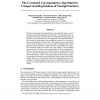Free Online Productivity Tools
i2Speak
i2Symbol
i2OCR
iTex2Img
iWeb2Print
iWeb2Shot
i2Type
iPdf2Split
iPdf2Merge
i2Bopomofo
i2Arabic
i2Style
i2Image
i2PDF
iLatex2Rtf
Sci2ools
NIPS
2004
2004
The Correlated Correspondence Algorithm for Unsupervised Registration of Nonrigid Surfaces
We present an unsupervised algorithm for registering 3D surface scans of an object undergoing significant deformations. Our algorithm does not need markers, nor does it assume prior knowledge about object shape, the dynamics of its deformation, or scan alignment. The algorithm registers two meshes by optimizing a joint probabilistic model over all point-topoint correspondences between them. This model enforces preservation of local mesh geometry, as well as more global constraints that capture the preservation of geodesic distance between corresponding point pairs. The algorithm applies even when one of the meshes is an incomplete range scan; thus, it can be used to automatically fill in the remaining surfaces for this partial scan, even if those surfaces were previously only seen in a different configuration. We evaluate the algorithm on several real-world datasets, where we demonstrate good results in the presence of significant movement of articulated parts and non-rigid surface de...
| Added | 31 Oct 2010 |
| Updated | 31 Oct 2010 |
| Type | Conference |
| Year | 2004 |
| Where | NIPS |
| Authors | Dragomir Anguelov, Praveen Srinivasan, Hoi-Cheung Pang, Daphne Koller, Sebastian Thrun, James Davis |
Comments (0)

